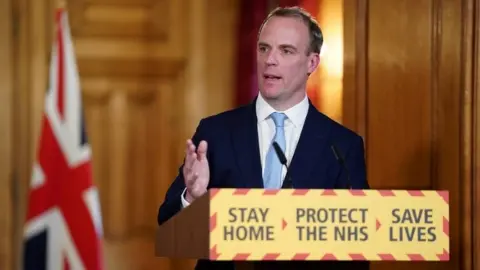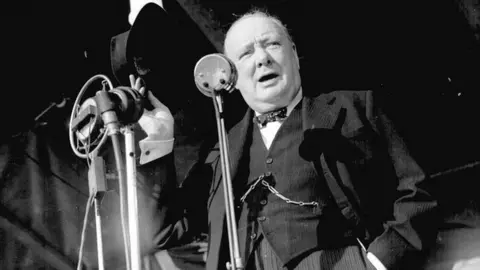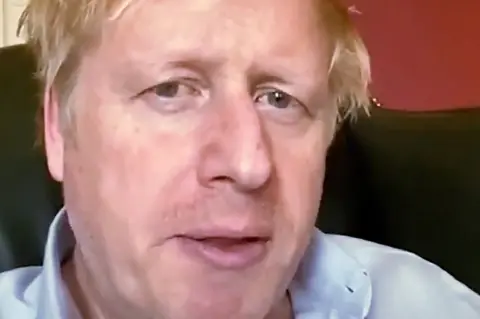Coronavirus: Why do we talk about 'fighting' illness?
 EPA
EPABeing tough - or a fighter - is often said to be an asset when someone has a serious illness, such as coronavirus, but is this sort of language helpful or misleading?
"I'm confident he'll pull through," said Dominic Raab, as he addressed the nation following Boris Johnson being taken into intensive care, "because if there's one thing I know about this prime minister, he's a fighter".
The foreign secretary, Mr Johnson's de facto deputy as prime minister, has come in for criticism for his choice of language.
It's not possible for a patient to "fight" a virus, as if it is a visible, human adversary, it's argued - that's the job of technology and medics. And, if someone succumbs to it, does this mean they have lost their "battle"?
Allow X content?

There was further reaction when Health Secretary Matt Hancock echoed Mr Raab's words:
Allow X content?

Angharad Rudkin, a clinical psychologist at the University of Southampton, feels Mr Raab's critics have a point.
"'Battle terminology' is most helpful when people are fully in control of outcomes when in a challenging or adverse situation," she says.
"For example, 'battling' through work or 'battling' your way through the traffic. It becomes less helpful when a person has little control over the outcome."
With coronavirus, unlike military conflict, the enemy is invisible and inside people. Instead of taking up arms, the public is being asked to undergo the tedium and privations of self-isolation and social distancing to prevent its spread.
In his address to the nation on 23 March, setting out further restrictions, Mr Johnson himself used distinctly military language, saying that "in this fight we can be in no doubt that each and every one of us is directly enlisted. Each and every one of us is now obliged to join together".
A few weeks earlier, he said: "Crucially, we must not forget what we can all do to fight this virus, which is to wash our hands with soap and hot water for the length of time it takes to sing Happy Birthday twice."
But the PM was calling for a "fight" against coronavirus as a whole, not asking patients - rather than doctors or nurses - to "take it on" after being infected.


- LIVE: China reports no new virus deaths for first time
- A SIMPLE GUIDE: How do I protect myself?
- AVOIDING CONTACT: The rules on self-isolation and exercise
- LOOK-UP TOOL: Check cases in your area
- MAPS AND CHARTS: Visual guide to the outbreak

"Not everyone is up for the fight," says Dr Rudkin. "Not everyone can fight. We need to be understanding of this and not judge others. Some may fight or battle bravely and still not 'win', but we need to see this as being more about the power of the attacker - the virus - than the fragility of the defender."
In 2016, the charity Breast Cancer Now raised concerns over the use of the expression "battling with cancer", questioning its accuracy as a description of what a patient goes through.
Instead, it suggested cutting out "emotive language" and using "simple, factual" alternatives. These included "living with cancer", "recovering from cancer treatment" and "having treatment for cancer".
 PA Media
PA MediaMr Raab's detractors might suggest he does the same when referring to Mr Johnson's coronavirus.
But language cannot be seen entirely outside its historical context, as politicians are well aware.
Coronavirus is often referred to as the biggest crisis facing the UK since World War Two.
Famously, following the evacuation of Dunkirk in June 1940, Prime Minister Winston Churchill delivered a House of Commons speech warning against complacency and of a long struggle ahead.
In its best-known passage, he promised: "We shall fight on the beaches. We shall fight on the landing grounds. We shall fight in the fields and in the streets. We shall fight in the hills. We shall never surrender."
 Getty Images
Getty ImagesCould Mr Raab, a former boxer and a black belt in karate, be tapping into Churchillian rhetoric himself?
The foreign secretary's comments, while arguably dubious in the strict medical sense, have the advantage of offering "plain English" that "people quickly understand" during a fast-moving crisis, says Pete Davies, managing director of Manchester-based Sugar PR, who advises corporate clients on crisis management and communications.
"If public relations teams and political communicators took into account the views of the language police on Twitter, there'd be no time to get vital life-saving messages across," he adds.
"The fact is, this is a fight that collectively we simply must win. Politicians shouldn't shy away from that term."
On an individual basis, the Centre for Perioperative Care has recommended people get as physically fit as possible to reduce the possibility of becoming seriously ill with coronavirus - the same advice it gives for pre-operation patients.
This could be interpreted as "battle-hardening" oneself for the tribulations ahead, but that is not the same as "fighting" the disease once it is contracted.
As for Mr Raab's words, says Dr Rudkin, while they are "flawed" in a strict medical sense, the use of combat imagery can "provide more comfort than anxiety" because it gives a sense of empowerment.
The idea of the prime minister catching and getting over coronavirus could extend the feeling of a collective struggle.
"The important thing is that we as a whole planet are in this together," Dr Rudkin says, "and there is a huge amount of strength that comes from knowing that."
At Wednesday's Downing Street briefing, Chancellor Rishi Sunak said Mr Johnson's condition was "improving" and he was "sitting up in bed", although he remains in intensive care at St Thomas' hospital in London.
